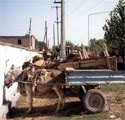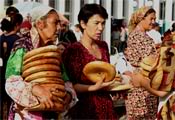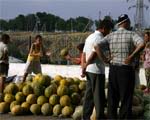Part II: Uzbekistan's Cotton
My colleagues from a public school in Uzbekistan gather around me and touch the scarf I am wearing.
"It's cotton! Look everyone! It's real cotton!" They touch it some more and then laugh together: shouldn't they be the ones wearing cotton clothes? After all, they are the ones who have to go pick it every autumn in the fields, along with students and nurses. But the cotton never comes around to the bazaars full of colorful, synthetic dresses and shirts.
I picked cotton last year, too. We all gathered in front of the railway station where a fleet of buses waited for all the assigned pickers to arrive. Roster in hand, the directors marked the teachers present, then let them climb into the crowded buses. The atmosphere is rather jovial because it might as well be. Old friends greet each other, jokes fly, and picnic basket contents are detailed in loud voices.
After all the buses are crammed, a militsiya car leads the way to the fields, while another closes the caravan. Two bus loads get dropped off at every field and the work is supposed to begin. Each group of teacher has a quota, each school has one, too, all that to match the regional quota. The teachers know all that, but they don't feel too concerned. Since they are not paid for this work, they will make the most of a day out in the fresh air. Ignoring the puffy white balls in clumps in front of them they find themselves a cozy place to rest, eat and tell stories.
They will occasionally get up to fill an apron or two of cotton and drop it off on the school's pile, but you can see a form of protest in their slowness.
All the cotton is weighed by the owner of the field and compiled in the director's notebook, before being thrown into the tractor. Follows a daily harangue by the school director: "More cotton! We need you to pick more cotton! You are so lazy! Shame on our school if you don't pick your quota!" And if the regional quota isn't reached by the end of the season, teachers, students and nurses are sent out in the cold November weather to pick the unopened cotton, crack it open with a stone, and collect whatever lousy whiteness is in there. Those are long hard days. Nothing like an indian summer picnic.
And there's still no cotton clothes in the local bazaar.





